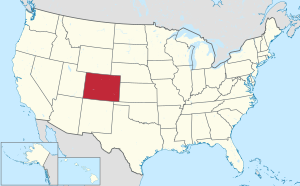Gilpin County, Colorado
Gilpin County | |
|---|---|
 The Gilpin Combined Court, the county courthouse. | |
 Location within the U.S. state of Colorado | |
 Colorado's location within the U.S. | |
| Coordinates: 39°52′N 105°31′W / 39.86°N 105.52°W | |
| Country | |
| State | |
| Founded | November 1, 1861 |
| Named for | William Gilpin |
| Seat | Central City |
| Largest city | Central City |
| Area | |
| • Total | 150 sq mi (400 km2) |
| • Land | 150 sq mi (400 km2) |
| • Water | 0.4 sq mi (1 km2) 0.2% |
| Population | |
| • Estimate (2015) | 5,828 |
| • Density | 36/sq mi (14/km2) |
| Time zone | UTC−7 (Mountain) |
| • Summer (DST) | UTC−6 (MDT) |
| Congressional district | 2nd |
| Website | www |
Gilpin County is the second-least extensive of the 64 counties of the U.S. state of Colorado, behind only the City and County of Broomfield. As of the 2010 census, the population was 5,441.[1] The county seat is Central City.[2] The county was formed in 1861, while Colorado was still a Territory, and was named after Colonel William Gilpin,[3] the first Governor of the Territory of Colorado.
Gilpin County is part of the Denver-Aurora-Lakewood, CO Metropolitan Statistical Area.
Geography

According to the U.S. Census Bureau, the county has a total area of 150 square miles (390 km2), of which 150 square miles (390 km2) is land and 0.4 square miles (1.0 km2) (0.2%) is water.[4] It is the second-smallest county by area in Colorado.
Adjacent counties
- Boulder County – north
- Jefferson County – east
- Clear Creek County – south
- Grand County – west
National protected areas
State protected area
Scenic trail and byway
Demographics
| Census | Pop. | Note | %± |
|---|---|---|---|
| 1870 | 5,490 | — | |
| 1880 | 6,489 | 18.2% | |
| 1890 | 5,867 | −9.6% | |
| 1900 | 6,690 | 14.0% | |
| 1910 | 4,131 | −38.3% | |
| 1920 | 1,364 | −67.0% | |
| 1930 | 1,212 | −11.1% | |
| 1940 | 1,625 | 34.1% | |
| 1950 | 850 | −47.7% | |
| 1960 | 685 | −19.4% | |
| 1970 | 1,272 | 85.7% | |
| 1980 | 2,441 | 91.9% | |
| 1990 | 3,070 | 25.8% | |
| 2000 | 4,757 | 55.0% | |
| 2010 | 5,441 | 14.4% | |
| 2015 (est.) | 5,828 | [5] | 7.1% |
| U.S. Decennial Census[6] 1790-1960[7] 1900-1990[8] 1990-2000[9] 2010-2015[1] | |||
As of the census[10] of 2000, there were 4,757 people, 2,043 households, and 1,264 families residing in the county. The population density was 32 people per square mile (12/km²). There were 2,929 housing units at an average density of 20 per square mile (8/km²). The racial makeup of the county was 94.37% White, 0.53% Black or African American, 0.82% Native American, 0.69% Asian, 0.19% Pacific Islander, 1.53% from other races, and 1.87% from two or more races. 4.25% of the population were Hispanic or Latino of any race.
There were 2,043 households out of which 26.90% had children under the age of 18 living with them, 53.00% were married couples living together, 5.70% had a female householder with no husband present, and 38.10% were non-families. 26.80% of all households were made up of individuals and 3.70% had someone living alone who was 65 years of age or older. The average household size was 2.32 and the average family size was 2.81.
In the county the population was spread out with 21.10% under the age of 18, 5.80% from 18 to 24, 37.40% from 25 to 44, 30.00% from 45 to 64, and 5.70% who were 65 years of age or older. The median age was 38 years. For every 100 females there were 112.70 males. For every 100 females age 18 and over, there were 116.10 males.
The median income for a household in the county was $51,942, and the median income for a family was $61,859. Males had a median income of $38,560 versus $30,820 for females. The per capita income for the county was $26,148. About 1.00% of families and 4.00% of the population were below the poverty line, including 1.40% of those under age 18 and 6.10% of those age 65 or over.
Communities
Historic district
See also
- Outline of Colorado
- Index of Colorado-related articles
- Arapahoe County, Kansas Territory
- Montana County, Jefferson Territory
- Colorado census statistical areas
- Denver-Aurora-Boulder Combined Statistical Area
- Front Range Urban Corridor
- National Register of Historic Places listings in Gilpin County, Colorado
References
- ^ a b "State & County QuickFacts". United States Census Bureau. Retrieved January 25, 2014.
- ^ "Find a County". National Association of Counties. Retrieved 2011-06-07.
- ^ Gannett, Henry (1905). The Origin of Certain Place Names in the United States. Govt. Print. Off. p. 138.
- ^ "US Gazetteer files: 2010, 2000, and 1990". United States Census Bureau. 2011-02-12. Retrieved 2011-04-23.
- ^ "Annual Estimates of the Resident Population for Incorporated Places: April 1, 2010 to July 1, 2015". Retrieved April 16, 2016.
- ^ "U.S. Decennial Census". United States Census Bureau. Retrieved June 8, 2014.
- ^ "Historical Census Browser". University of Virginia Library. Retrieved June 8, 2014.
- ^ "Population of Counties by Decennial Census: 1900 to 1990". United States Census Bureau. Retrieved June 8, 2014.
- ^ "Census 2000 PHC-T-4. Ranking Tables for Counties: 1990 and 2000" (PDF). United States Census Bureau. Retrieved June 8, 2014.
- ^ "American FactFinder". United States Census Bureau. Retrieved 2011-05-14.


